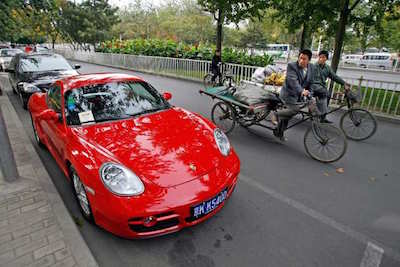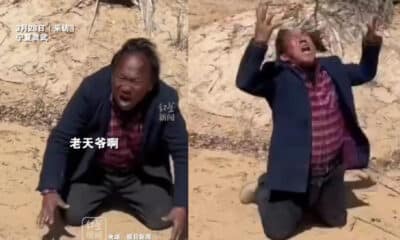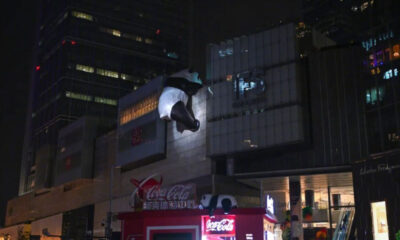Interviews & Events
Beyond ‘Under the Dome’ – What’s not on Weibo
When pollution-themed documentary “Under the Dome” by former CCTV reporter Chai Jing became a trending topic on China’s social media platforms, it was blocked by censors. Expert on China’s environment Fishjourner: “It’s a confusing time for China in terms of environmental issues.”
Published
10 years agoon

This interview with environmental expert Fishjourner was conducted and condensed by Manya Koetse in Beijing in March 2015.
Environmental issues have been the talk of Beijing for the past month. As air quality levels reached 400 again, the pollution-themed documentary “Under the Dome” (“穹顶之下”) by former CCTV reporter Chai Jing (柴静) became a trending topic on China’s social media platforms and media at large. On Sina Weibo alone, there were 280 million posts related to the topic.
As the documentary went viral, the Chinese government was quick to block it from China’s video platforms. State Council Premier Li Keqiang addressed the theme of the documentary on March 15, saying that the right execution of environmental laws is a key issue for Chinese leaders in the year to come: China is “declaring war” on pollution. As both the people and the government are seemingly more concerned about the future of China’s environment, some say this is the beginning of a national awakening on the dangers of pollution.
Australian born Fishjourner (pseudonym) is an expert on China’s environment. As an environmental planner who has been living and working in Beijing for over eight years, he says: “It’s a confusing time for China in terms of environmental issues; people care about them, but their concern only goes as far as their own backyard.” What’s on Weibo sat down with Fishjourner to discuss the issues beyond Under the Dome and how what is buzzing online looks like in the reality of China today.
UNDER THE DOME
“This documentary gave people freedom to comment- so they jumped at it.”
Under the Dome is a TED-talk-like documentary in which Chai Jing explains China’s environmental problems through the use of graphs, photos and the personal stories of people affected by pollution – including her own daughter. “The documentary did not even survive one week on China’s internet,” Fishjourner says: “The video notably came out by the end of February on Renminwang‘s video site, the website of the PRC-owned People’s Daily. Although initially it had at least in-principle backing of the government, the documentary quickly got so much attention that they had it removed after three days.” Under the Dome received over one hundred million views on Chinese video sites such as Youku or Tencent after February 28. The perhaps unexpected interest in the documentary makes it seem like Chinese people are increasingly more aware about environmental issues and, specifically, pollution. “The Chinese average Joe is indeed getting more concerned about these issues,” Fishjourner says: “But the online hype of the video also relates to other issues. When you are in a society where you are not free to express your opinion on many subjects, and then are somehow given freedom to do so, people are going to jump on it. This is what happened. The floodgates were opened, so to speak.” Within three weeks, Chai’s documentary went from being a national sensation to being blocked to its mention in Li Keqiang’s speech on the environment and polluting companies. Although (social) media was buzzing, the buzz was not necessarily noticeable on the streets in China: “The documentary went down, the freedom to comment was over, and people continued to live their lives again. It is out of their control. It has not instigated a political movement, and is not necessarily all about environmental issues,” Fishjourner says.
DEALING WITH POLLUTION IN CHINA
“Reactions to pollution can be quite extreme.”
Smoggy air, car exhaust, soil pollution, grimy canals – pollution is noticeable in everyday life in Beijing and many other cities in China. People wearing face masks have become an ordinary urban phenomenon. “There are some who will even wear them when it is a nice day with blue skies,” Fishjourner says. The face masks are just one example of how people deal with pollution on a daily basis: “Pregnant women will wear anti-radiation gowns to protect their babies. Within people’s homes and offices, air purifiers are all the rage.” As Fishjourner explains how indoor air quality is an important issue for many Chinese, he also says that some people react to pollution in extreme ways: “The effect of smog on the body is cumulative. The more you breathe, the more pollutants you take into your body. It will indeed create acute health effects when the Air Quality Index reaches 500, but you won’t get cancer tomorrow.”
In Under the Dome, Chai Jing alluded to her daughter’s illness being smog-related. In doing so, she struck a cord with Chinese audiences – protecting one’s health and that of the family is important in people’s attitude towards pollution: “A friend of mine paid high fees to get his daughter into a local kindergarten. When they painted the walls there, he paid two months of fees without letting her attend- he wanted the smell of paint to leave the air before he would let her go back again.” According to Fishjourner, the concern for air quality relates to an overall distrust with Chinese products and companies: “Coming from Australia or America, we often blindly assume or trust that it is okay if we smell paint or factory fumes and that it won’t actually hurt us. But in China, people don’t know what they’re getting. The milk scandal has proved that even baby milk powder cannot be trusted. This has made people more paranoid on other issues too. When they smell strong paint, it could be potentially harmful. Where did it come from? What’s the brand? Who fabricated it? Are all the ingredients legal and safe? Asking questions about air quality and pollution is not political – it is a way to keep yourself and your family healthy.”
NOT IN MY BACKYARD
“Chinese are unhappy about where they are – unhappy in a good way.”
Although concerns with pollution are visible in everyday life in China, the average person does not really about the environment, according to Fishjourner: “Ask any taxi driver what he cares for more: China’s pollution problem or getting the next customer through Weixin.” Improving individual lives in real ways is a top priority, and money is an important part of it: “There is this general belief that life will be better by generating more cash, and that things will keep improving. Many Chinese are actually unhappy about where they are – they are unhappy in a good way. They are prepared to do anything to change their reality.” Although the general attitude on setting up businesses and generating cash has helped China’s economy to grow, there is a big downside to it for the environment: “While businesses are all about making money, the environmental side is often ignored. The fact that improving environmental issues is a key part of sustaining China’s prosperity, yet this is not readily incorporated in the concept of making progress.”
“For many Chinese, what is in their control is something they are paranoid about, and what they cannot control is something they don’t care about.”
According to Fishjourner, common self-awareness on the environment is crucial: “People will personalize environmental issues in terms of protecting themselves or their kids from air pollution or other risks, but they have not yet started to internalize them. You can wear a face mask to work, but if you still throw out your garbage on the street, waste water on hour-long showers and don’t adhere to environmental guidelines in business, it does not change anything in the long run.” Fishjourner emphasizes that China can be a messy country where everything that is ‘outside’ one’s own circle is ignored: “Just compare any stairwell to the apartments that it leads to and you will know what I mean.” Fishjourner goes on to say: “This also has to do with the government and political involvement. People have learnt to cope with the fact that they cannot influence political or national issues. It comes down to this; what is in their control is something they are paranoid about, and what they cannot control is something they don’t care about. Environmental issues therefore only matter to people when they happen in their own backyard – the rest is unfortunate, but irrelevant.”
BEYOND SAVING THE PANDA
“Environmental protection in China is a very cruel balancing act.”
There is still a long road ahead for improving environmental issues in China. “The government can express its concerns for the environment, but the bosses of local factories will not care because they have not internalized these concerns.” Fishjourner says: “Life becomes unsustainable in this way.” Little things eventually will determine the bigger decision-making: “First comes increasing levels of self-awareness on being part of improving the environment by saving on water, how you use your car, how much plastic you use, etc. This kind of self-awareness is almost non-existent in China.” Although the government has shown willingness to raise awareness on these issues with numerous public service announcements, it is important that it comes from both sides, says Fishjourner: “If you want to make people understand that it is all coming down to you and me, the government has to set the right example by balancing economic development and basic environmental resources. This is much more basic than saving the panda, yet nowhere as cute; it is about healthy food for everybody, safe water, clean air.” Fishjourner admits that the tasks at hand are challenging. “Virtually everybody in China has a desire to earn more cash, get a better house and have a car – but if this is going to happen for everybody, it will only increase the strain on the environment. How can this be balanced? It is a very cruel balancing act, because Beijing’s desire to develop so quickly also means it is more likely to cut corners to make sure basic human needs are still met.”
“The environmental situation in China is entirely unforgiving, from population density to the sheer number of cars and vast industrial operations. China is in a much more challenging position than other countries because of both the size and volume of its endeavours: if one poor choice is made, consequences could be catastrophic. The magnitude of every decision is unfathomable: if you get things wrong, you may have compromised everything.”
For Fishjourner, China’s environment is the reason to be there: “Every day, I am excited to be here. I could be in Australia with its blue skies and pristine beaches. Although I hate waking up to a smoggy Beijing day where the air quality has reached another zenith, the fact that environmental issues are so tangible makes it more challenging and relevant for me to work here.” Despite it all, Fishjourner does not feel that he is on a mission to save China’s environment. “I am not a dreamer. I know that everything we do has an environmental impact, and I want to eat what I want to eat, take my showers, go shopping and use my computer. With that said, I still would like to influence this country for the better. And in today’s China, just doing the little things can be a big cause.”
– by Manya Koetse
Images used
http://article.wn.com/view/2013/10/18/The_World_Health_Organization_Declares_Air_Pollution_an_Offi/
https://johnib.wordpress.com/tag/clean-air-act/
http://latimesblogs.latimes.com/money_co/2011/09/economic-conditions-around-the-world-may-be-deteriorating-but-you-couldnt-tell-by-the-headlines-in-chinathe-latest-list-o.html
http://graphics8.nytimes.com/images/2013/01/30/world/asia/30JanPollution1/30JanPollution1-superJumbo.jpg
– Appreciate our work and want to help us pay for the upkeep costs of What’s on Weibo? You can do so here! Every penny helps.
[box type=”bio”]  About the Author: Manya Koetse is the editor of What’s on Weibo. She’s a Sinologist who splits her time between the Netherlands and China. She earned her bachelor’s degrees in Literary Studies, Japanese & China Studies and completed her MPhil in Asian Studies. Contact: manya@whatsonweibo.com, or follow on Twitter.[/box]
About the Author: Manya Koetse is the editor of What’s on Weibo. She’s a Sinologist who splits her time between the Netherlands and China. She earned her bachelor’s degrees in Literary Studies, Japanese & China Studies and completed her MPhil in Asian Studies. Contact: manya@whatsonweibo.com, or follow on Twitter.[/box]
©2014 Whatsonweibo. All rights reserved. Do not reproduce our content without permission – you can contact us at info@whatsonweibo.com.
Manya is the founder and editor-in-chief of What's on Weibo, offering independent analysis of social trends, online media, and digital culture in China for over a decade. Subscribe to gain access to content, including the Weibo Watch newsletter, which provides deeper insights into the China trends that matter. More about Manya at manyakoetse.com or follow on X.

China and Covid19
CCTV New Year’s Gala 2020: Highlights and Must-Knows (Liveblog)
What is Chinese New Year without the CCTV Spring Gala? What’s on Weibo reports the must-knows of the 2020 ‘Chunwan.’
Published
5 years agoon
January 24, 2020
WHAT’S ON WEIBO ARCHIVE | PREMIUM CONTENT ARTICLE
Chinese social media is dominated by two topics today: the CCTV New Year Gala (Chunwan) and the outbreak of the coronavirus. Watch the livestream of the CCTV Gala here, and we will keep you updated with tonight’s highlights and must-knows as we will add more information to this post throughout the night. (This liveblog is now closed.)
As the Year of the Rat is just around the corner, millions of people in China and beyond are starting the countdown to the Chinese New Year by watching the CCTV Spring Festival Gala, commonly abbreviated in Chinese as Chunwan (春晚).
The role of social media in watching the event has become increasingly important throughout the years, with topics relating to the Chunwan becoming trending days before.
Making fun of the show and criticizing it is part of the viewer’s experience, although the hashtag used for these kinds of online discussions (such as “Spring Festival Gala Roast” #春晚吐槽#) are sometimes blocked.
The Gala starts at 20.00 China Central Time on January 24. Follow live on Youtube here, or see CCTV livestreaming here.
About the CCTV New Year’s Gala
Since its very first airing in 1983, the Spring Festival Gala has captured an audience of millions. In 2010, the live Gala had a viewership of 730 million; in 2014, it had reached a viewership of 900 million, and in 2019, over a billion people watched the Gala on TV and online, making the show much bigger in terms of viewership than, for example, the Super Bowl.
The show lasts a total of four hours, and has around 30 different acts, from dance to singing and acrobatics. The acts that are both most-loved and most-dreaded are the comic sketches (小品) and crosstalk (相声); they are usually the funniest, but also convey the most political messages.
As viewer ratings of the CCTV Gala in the 21st century have skyrocketed, so has the critique on the show – which seems to be growing year-on-year.
According to many viewers, the spectacle generally is often “way too political” with its display of communist nostalgia, including the performance of different revolutionary songs such as “Without the Communist Party, There is No New China” (没有共产党就没有新中国).
To take a look at what was going on during the Spring Gala’s previous shows, also see how What’s on Weibo covered this event in 2016, in 2017, in 2018, and in 2019.
Live updates
Check for some live updates below. (We might be quiet every now and then, but if you leave this page open you’ll hear a ping when we add a new post). (Update: Live blog closed)
Happy New Year Wishes from Wuhan People’s Hospital
[Jan 24 / 17:30 CST]
Medical staff at the dedicated isolation ward of Wuhan’s People’s Hospital wish everyone a Happy New Year, saying: “We’re here, don’t worry [and celebrate Spring Festival]” – a hashtag that’s now propagated online to ease the #coronavirus panic. #有我们在大家安心过年
Medical staff at the dedicated isolation ward of Wuhan’s People’s Hospital wish everyone a Happy New Year, saying: “We’re here, don’t worry [and celebrate Spring Festival]” – a hashtag that’s now propagated online to ease the #coronavirus panic. #有我们在大家安心过年 pic.twitter.com/byWLd8DJ1i
— Manya Koetse (@manyapan) January 24, 2020
Director of the Gala: Yang Dongsheng
[Jan 24 / 17:57 CST]
This year’s director is Yang Dongsheng (杨东升) from Guangdong (see picture below), who also directed the Gala in 2017 and 2018. With Avatar-like settings for dance and singing acts in 2017, spectacular light and dance show in 2018, we can also expect tonight’s show to be colorful and big.
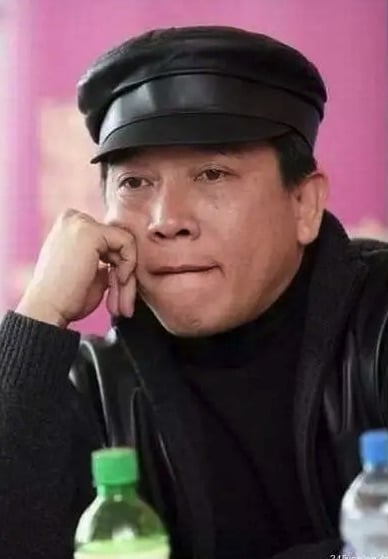
Jiayou Wuhan, Jiayou China!
[Jan 24 / 19:57 CST]
In the ten minutes leading up to the CCTV Gala, it is clear that the coronavirus outbreak in Wuhan is not a news topic that will be ignored tonight.
The presenters have a strong message showing their support to the patients and people in Wuhan and beyond, saying: “Jiayou Wuhan, Jiayou China!” – Come on Wuhan! Come on China!
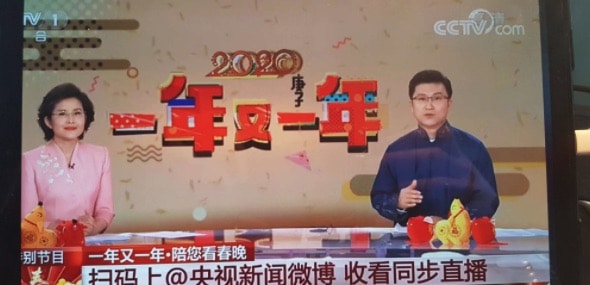
It just started and the first memes are here
[Jan 24 / 20:10 CST]
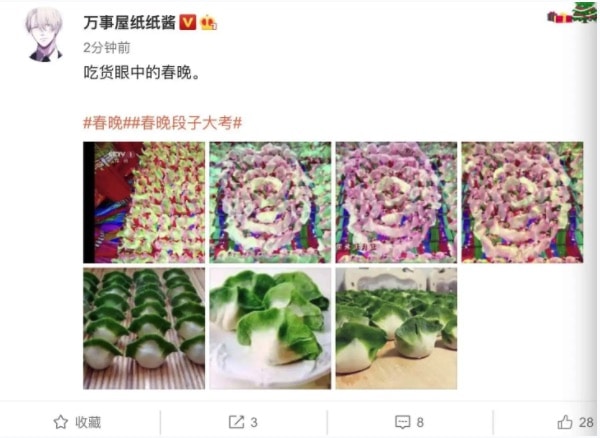
The first act has only just completed and already there are memes going around Chinese social media, comparing the dancers in the act to Chinese cabbages..
Time to have a “live look” inside the main hospital in Wuhan!
[Jan 24 / 20:40 CST]

A special moment during the CCTV Gala as the show switched to one of Wuhan’s main hospitals right now to get an update from the nurses there who are spending their Chinese New Year night taking care of the many people infected with the coronavirus.
According to the presenter, the switch was “very last minute.”
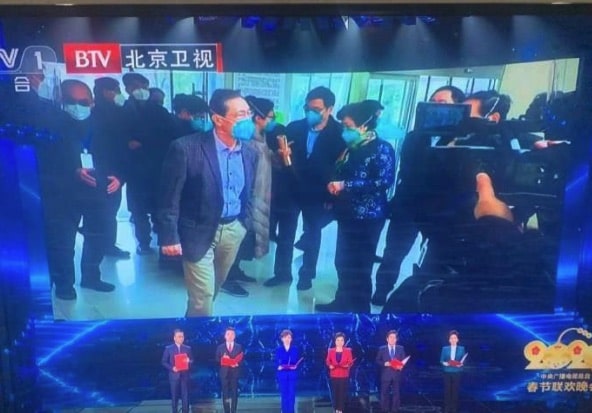
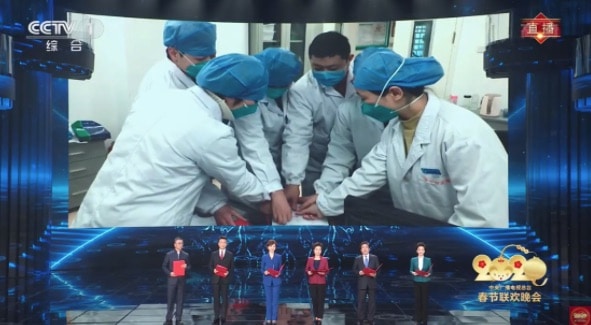
The presenters also take this time to thank all of those people sacrificing their time and energy to take care of the ill.
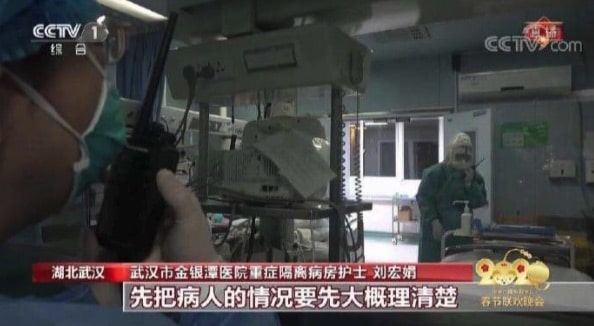
Global Times editor Hu Xijin also posted about the “last minute” Wuhan segment, and praised it for communicating the feelings and worries of Chinese people.

“Who has been eating wild game?!”
[Jan 24 / 20:44 CST]
With the outbreak of the coronavirus, the eating of wild game has been severely criticized on Weibo these days. This meme of the sketch performed by actor Yue Yunpeng (岳云鹏) during tonight’s Gala says: “Let’s see which idiot still dares to eat wild game?!”
Read more about the backlash against wild game eating here.
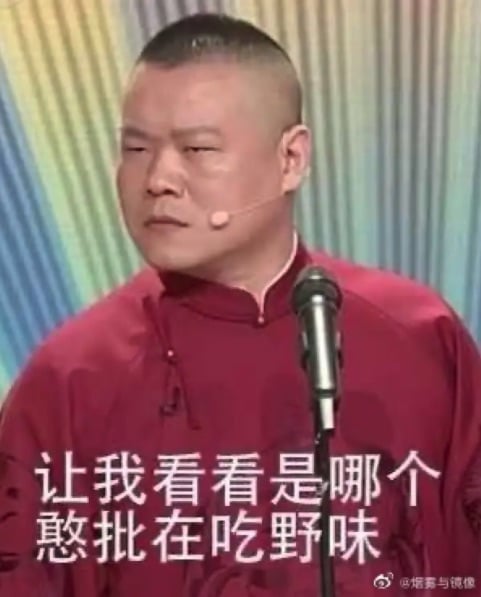
Some people only think about food during Chinese New Year…
[Jan 24 / 20:53 CST]
We already said that this CCTV Gala, directed by Yang Dongsheng, would be a colorful one. For some viewers, the dance performance set up at the start of this night just looks like food.
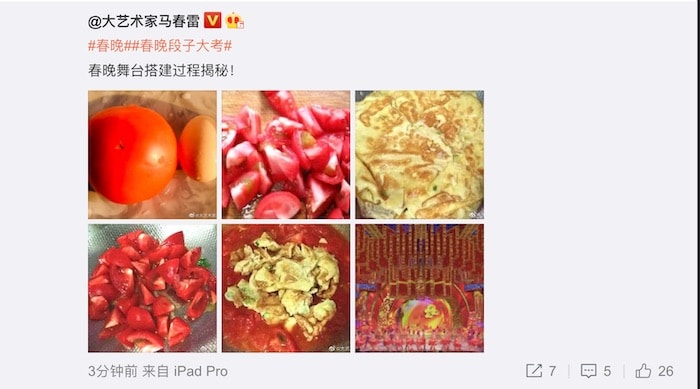
[Jan 24 / 21:03 CST]
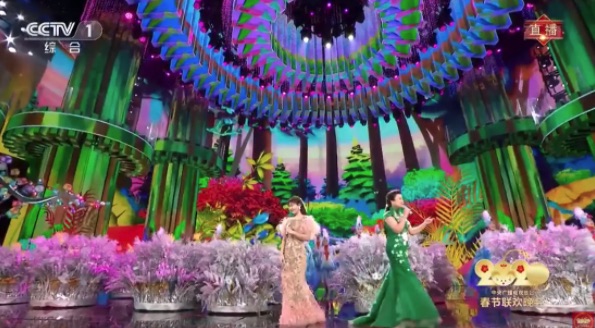
#春晚历史上首次没有彩排的片段#
[Jan 24 / 21:18 CST]
As the night continues, people on Weibo are still talking about the segment in the show that cut to the Wuhan hospital. For the first time since 1983, the CCTV Gala included a segment that was not rehearsed. The topic is making its way around social media under the hashtag “For the first time in history, the CCTV Gala airs unrehearsed segment” (#春晚历史上首次没有彩排的片段#).
How much is live?
[Jan 24 / 21:45 CST]
Although this Gala is a live broadcast from CCTV’s No.1 Studio in Beijing, combined with broadcasting from different other venues (this year: Guangdong, HK, Zhengzhou, Macao). every year’s show has a taped version of the full dress rehearsal. The tape runs together with the live broadcast, so that in the event of a problem or disruption, the producers can seamlessly switch to the taped version without TV audiences noticing anything.
Because of the outbreak of the coronavirus, Beijing seems to be the only location that is actually aired live tonight, with the other locations using pre-recorded versions.
What’s tonight’s theme?
[Jan 24 / 21:53 CST]
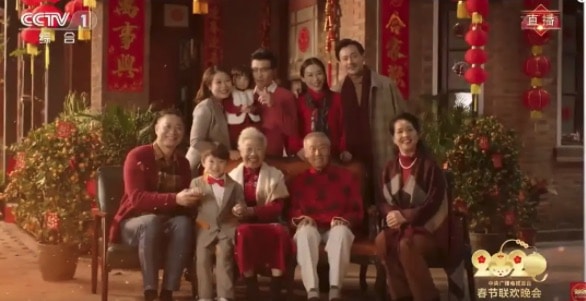
Every year, the CCTV Gala has a different theme. Sometimes, these themes are very clear, such as the “Chinese Dream” in 2016, or “National Unity” in 2017.
This year marked the 70th anniversary of the People’s Republic of China, and the Gala seems to have an umbrella theme capturing issues such as the celebration of 70 years ‘New China,’ the fight against poverty, unity among all languages and ethnic groups within China, and China’s important role in international society (especially marked by the first act, showing dancing and performances from different One Belt, One Road countries).
2020, I Love You
[Jan 24 / 21:53 CST]
This catchy poppy song is called “Hello 2020″(你好2020), performed by various artists.
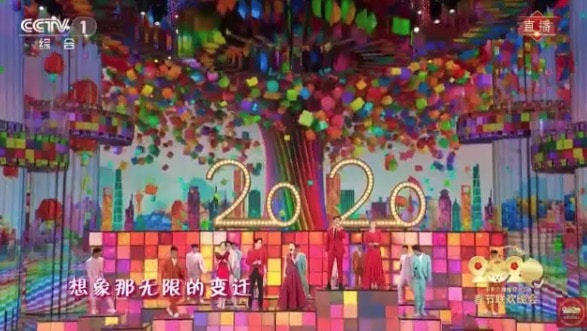
Stunning Dance “Morning Light”
[Jan 24 / 22:02 CST]
This is one of the dance performances of tonight, called “Morning Light” and led by Zhu Jiejing. The performance is by the Shanghai Song and Dance Troupe. Zhu Jiejing was born in October, 1985 in Jiaxing of Zhejiang Province. She won a top award for dance in China.
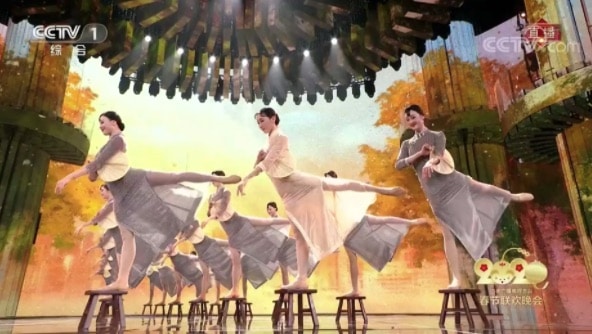
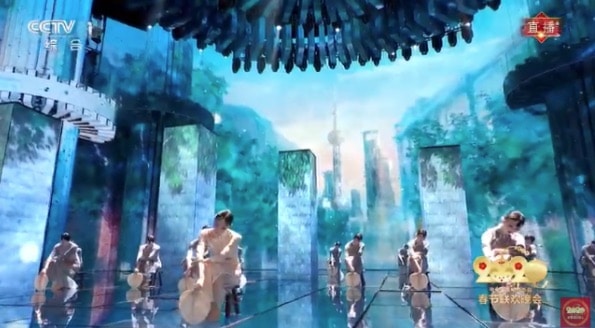
Kuaishou x CCTV Gala
[Jan 24 / 22:06 CST]
Tonight’s show is done in cooperation with Kuaishou, a hugely popular Chinese video sharing app. The CCTV Gala usually has different social media and/or online partners – which usually means a boost for these online platforms.
“My Motherland”
[Jan 24 / 22:32 CST]
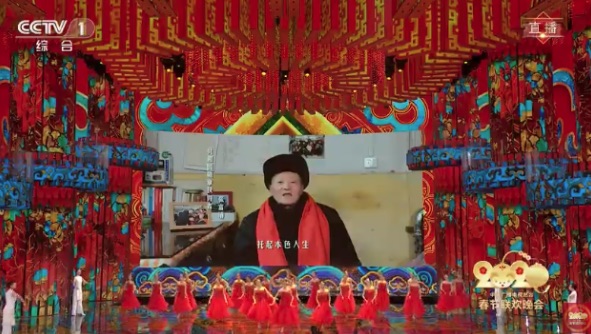
The inevitable patriotic song “My Motherland” is here, including a segment with the 90-year-old singer Guo Lanying (郭兰英).
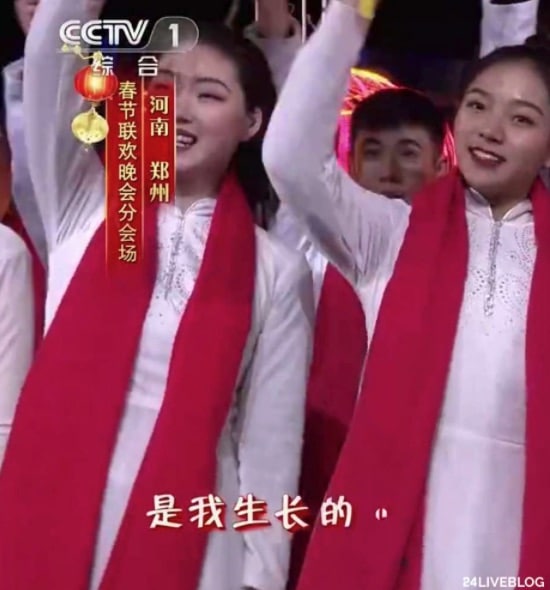
BUT WHERE ARE THE DANCING ROBOTS?!
This is Guo Lanying singing the song for the first time at the Chunwan in her younger years, 30 years ago:
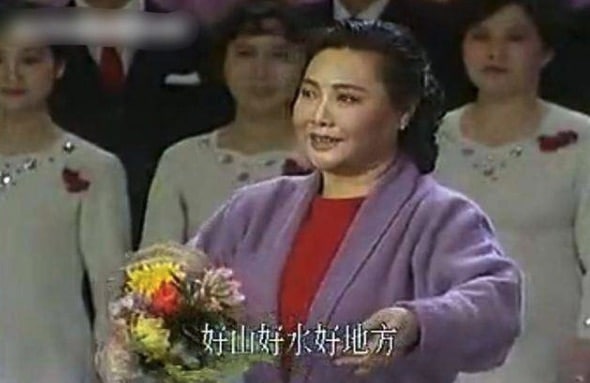
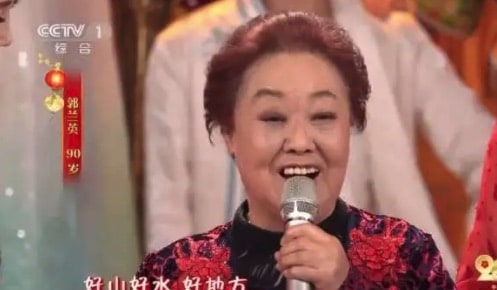
Spectacular footage from Zhengzhou
[Jan 24 / 23:03 CST]
We’re moving to one of the venues outside of Beijing – this is one of the prerecorded segments including piano play by the renowned Lang Lang, followed up with a song by Sun Nan (孙楠) and Li Yuchun (李宇春).
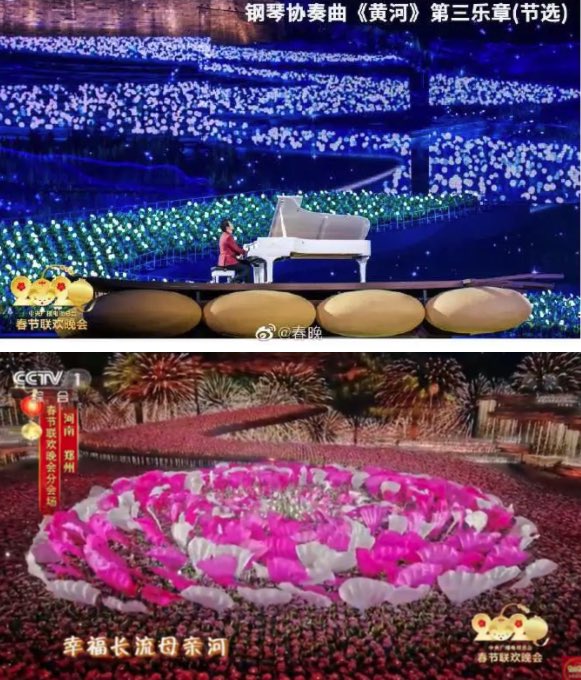
Meanwhile on Weibo
[Jan 24 / 23:04 CST]
Seen on Weibo: running out of proper face protection masks, these medical workers are using file folders to make their own face masks. #coronarovirus pic.twitter.com/gHtbAkHeu7
— Manya Koetse (@manyapan) January 24, 2020
Mixed feelings: CoronaVirus and Chunwan share the Weibo stage
[Jan 24 / 23:18 CST]
On Weibo, there are many netizens sharing their mixed feelings about tonight and going on social media, with some posts being about the CCTV Gala and happiness, and the others being about the situation in Wuhan and the despair. “I am laughing and crying,” some write.
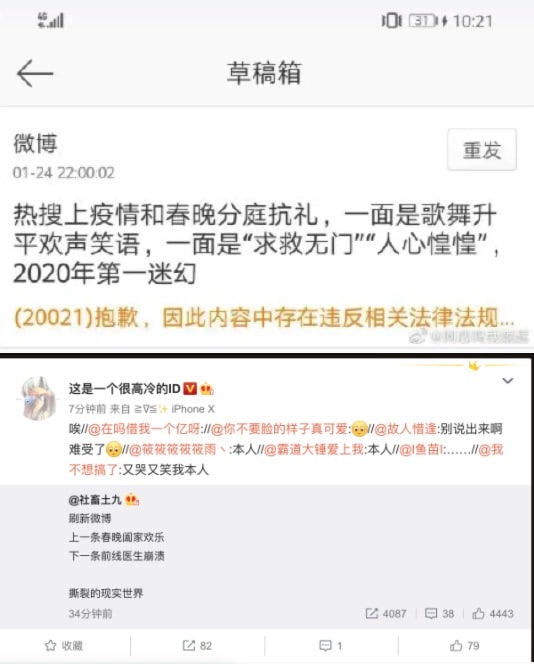
[Jan 24 / 23:39 CST]
On Weibo, @HuXijin_GT posted some of the photos that are now being shared of the army coming in to offer (medical) help amidst #coronavirus outbreak. Many people on Weibo address their mixed feelings: happiness over #Chinesenewyear, worry and fear over the Wuhan situation. pic.twitter.com/6YVmA3GHkL
— Manya Koetse (@manyapan) January 24, 2020
A ‘Yellow River’ of humans
[Jan 24 / 23:47 CST]
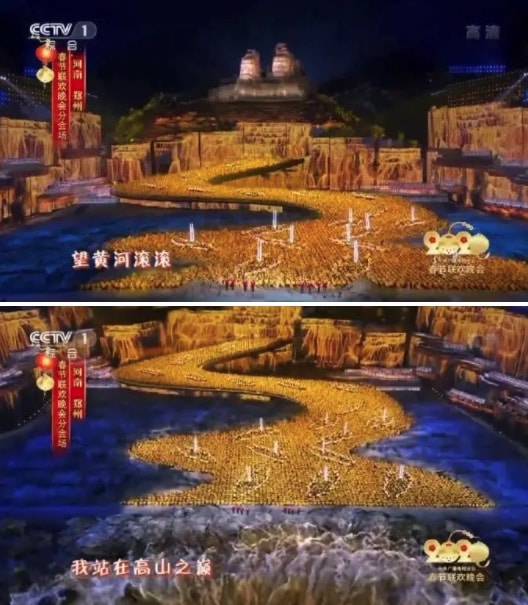
Chunwan and Coronavirus: stark contrast night
[Jan 24 / 23:52 CST]
While Miranda and Manya are watching the CCTV Gala and keeping an eye on social media developments, editor-in-chief Manya just joined BBC World News to briefly address the current social media developments regarding the coronavirus outbreak. See embedded tweet below.
In between watching the #CCTVGala and staying glued to Weibo, I just joined BBC World News live to comment on the social media environment in China during the #coronavirus outbreak. Segment of interview 👇 pic.twitter.com/dzwzI8zYnm
— Manya Koetse (@manyapan) January 24, 2020
Will tonight’s show break viewership records (again)?
[Jan 25 / 00:24 CST]
Over the past few years, the number of people watching the CCTV Gala has increased because of the many people watching the event via online platforms. Youtube is one of the platforms outside of China where the event is being livestreamed, and where over 105,000 people are joining.
Together with the traditional TV audiences, the CCTV online viewership, and the total number of people watching via other apps, will tonight’s show cross the one billion record again?
If you’re not watching the #cctvgala livestream on YouTube: there’s over 105,000 people watching this right now and the chat is going crazy. pic.twitter.com/vGCENUZ7dM
— Manya Koetse (@manyapan) January 24, 2020
Wear your facemask
[Jan 25 / 00:26 CST]
Just before the end of the show, a public service announcement reminds viewers to wear a face mask in times of the Corona virus outbreak.
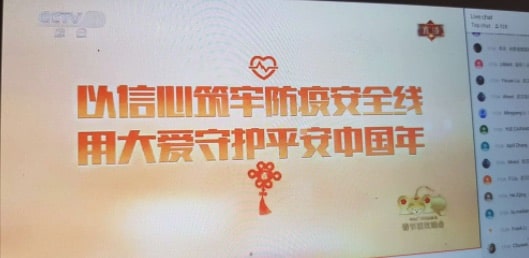
It’s a wrap
[Jan 25 / 00:59 CST]
It’s a wrap for tonight, so we will close our updates here, but stay tuned the coming days and weeks as we will keep a finger on the pulse of everything happening on Chinese social media and online discussions regarding the Chinese New Year travel season and the outbreak of the coronavirus. Thanks for joining, and a Happy New Year of the Rat!
By Manya Koetse and Miranda Barnes
Follow @whatsonweibo
Do you like what we do? You can donate here to keep this site alive & kicking.
Spotted a mistake or want to add something? Please let us know in comments below or email us. First-time commenters, please be patient – we will have to manually approve your comment before it appears.
©2020 Whatsonweibo. All rights reserved. Do not reproduce our content without permission – you can contact us at info@whatsonweibo.com.
China Arts & Entertainment
Chunwan Is Here! The CCTV Spring Festival Gala 2019 Live Blog
The CCTV New Year Gala is here! We’re live-blogging and keep you updated with the highlights and the low points.
Published
6 years agoon
February 2, 2019
WHAT’S ON WEIBO ARCHIVE | PREMIUM CONTENT ARTICLE
First published
It is time for China’s biggest TV event of the year! Chunwan (春晚) aka the CCTV Spring Festival Gala is celebrating its 37th edition and kicks off the Year of the Pig. Watch the festival together with What’s on Weibo, as we’ll keep you updated with the ins & outs of the Gala here.
It is that time of the year again. The Chinese New Year, better known as Spring Festival, is about to start. The annual CCTV Gala celebrates the start of the festival with its 4 hours long live televised show. After live-blogging this event in 2016, in 2017, and in 2018, we’re here this year again to keep you updated throughout the show on what’s going on.
A live-streaming of the Gala is embedded in this post and will be live on Monday, February 4, 20.00 pm China Standard Time. If you have any difficulties watching, check out this YouTube link, livestream from Weibo, or watch straight from CCTV. We will be live-blogging on this page here (NOTE: this liveblog is now closed, the event is over. We’ll provide you with the entire text of the liveblog below this article!)
About the show
The CCTV New Year’s Gala (中国中央电视台春节联欢晚会 or Chunwan 春晚) is an annual live television event that is broadcasted by the national television station CCTV on New Year’s Eve. It first aired in 1983, and is watched by millions of people. In 2012, it broke the Guinness records for being the “most watched national network broadcast in the world” when it had over 500 million viewers. Last year, the show drew more than one billion viewers (Gao 2012; Jing 2019).
Despite the common criticism on the show, it is still much anticipated every year. The Gala features different acts, including singing, dancing, and comedy. It is a tradition for families to gather around the TV to watch the Gala before the New Year comes at midnight. It has also become a tradition to comment on the show and complain about it, something that is especially visible on Chinese social media, where the show inevitably becomes a trending topic every year. Criticism on the Gala is actually so commonplace that the sentence “there’ll never be a ‘worst’, just ‘worse than last year‘ (央视春晚,没有最烂,只有更烂) has become a popular saying over the years (Wang 2015, 192).
Although the Gala is a live broadcast from CCTV’s No.1 Studio, every year’s show has a taped version of the full dress rehearsal. As described by Scocca (2011), the tape runs together with the live broadcast, so that in the event of a problem or disruption, the producers can seamlessly switch to the taped version without TV audiences noticing anything.
Liveblog CCTV Gala 2019 (in order of appearance)
It is time for China’s biggest TV event of the year! Chunwan (春晚) aka the CCTV Spring Festival Gala is celebrating its 37th edition and kicks off the Year of the Pig. Watch the festival together with What’s on Weibo, as we’ll keep you updated with the ins & outs of the Gala.
(13:30) Six Hours To Go before the CCTV Gala, And Already Sparking Controversy
Just some six hours to go before the annual biggest live televised event in the world, the Chunwan, kicks off, and already the program’s timetable is sparking controversy: one of China’s biggest comical actors, Feng Gong (1957), will not participate in tonight’s event after performing there for 32 years.
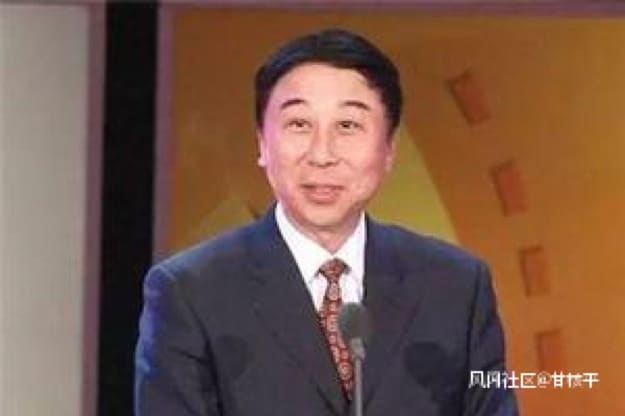
Feng Gong’s ‘xiangsheng’ crosstalk sketch apparently did not meet the requirements of the show’s strict screening, meaning his act will not come up tonight. Thousands of Chinese netizens are disgruntled, saying that Feng Gong’s appearance during the show has a certain nostalgic meaning to them. The topic has hit Weibo’s top trending lists, already hitting 130 million views earlier this afternoon. Read more about this during our live blog later today.
(19:15) The “Real” Very First Spring Festival Gala
The CCTV Gala was first aired in 1983, a year that is thus marked as the start of the Spring Festival TV Gala. But before this time, as early as 1956, Beijing Television’s also had irregular New Year’s Eve broadcasts. Trending on Chinese social media now is the hashtag “The Real First Chunwan” (#真正的第一届春晚#), with footage going viral of the 1956 edition (link) – receiving 250 million views at time of writing.
Beijing opera master Mei Lanfang participated in this event, along with other renowned names, such as Chinese novelist/dramatist Lao She and famous scientists.
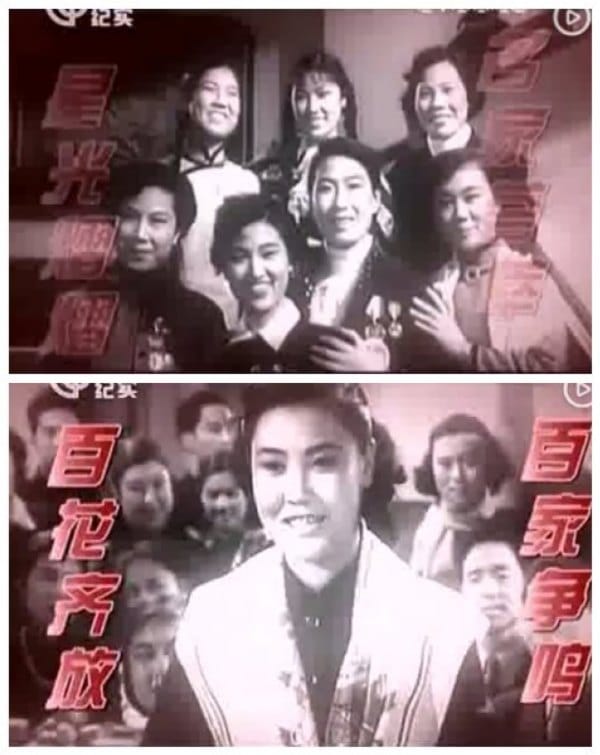
“That [Gala] was better then than it is nowadays,” many commenters write. “We’re at a historical low,” others say, suggesting that the CCTV Gala as it is now is focusing too much on popular celebrities rather than on intellectuals, artists, and scientists.
The complaining has already started, and the Gala is yet to begin!
(19:55) It’s starting! What can we expect tonight?
If you’ve previously seen the CCTV Gala, you probably know the sort of things you can expect tonight. The Spring Festival spectacle is always a mix of Chinese culture, commerce, and politics.
The show is notorious for carrying official propaganda and clearly emphasizing the themes that matter to the Party. However, no CCTV Gala is exactly the same, and there are always some noteworthy things about every annual show – in a rapidly changing China, the show always has certain changing features or styles that highlight a specific image of China and Chinese society, which can be telling for the official strategies on Chinese domestic and international affairs that lie beneath this constructed narrative & image.
Last year, for example, it was quite remarkable that although the show had many political underlying themes, such as China’s military expansion and the One Belt One Road initiative, there were no performances explicitly focusing on Chinese leaders, such as in previous years, nor were there obvious Party-focused songs such as “Without the Communist Party, There is No New China.”
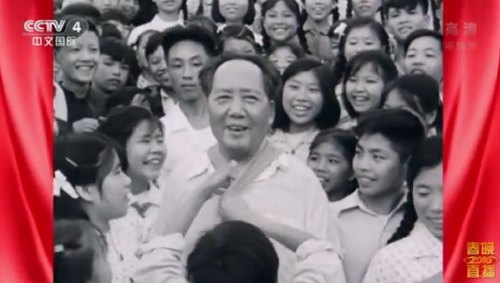
Tonight might see a similar trend as last year; the various acts and clips might not necessarily focus on the Communist Party and its leaders, but instead focus more on society, the people, ‘coming together,’ ethnic unity, and traditional Chinese culture.
There will be plenty of singing, dancing, and comical skits as well as ‘crosstalk’ sketches, some magic, opera, and acrobatics. Some 40 performances will take place over the next four hours.
There will also be a few short clips, ‘public service announcements,’ that usually focus on family values and socio-cultural unity. And we’re likely to see Jackie Chan again with a patriotic song.
(20:02) Dreamy Opening Dance
The opening act is titled “Sea of Spring’ (春海), led by, among others, Wang Qian, Song Yulong, Li Xiang, Yan Dingwen, Li Rongzhi, and Lin Qingjing. Various dance troupes are on stage, including that of the Shandong Art School and Shandong Normal University.
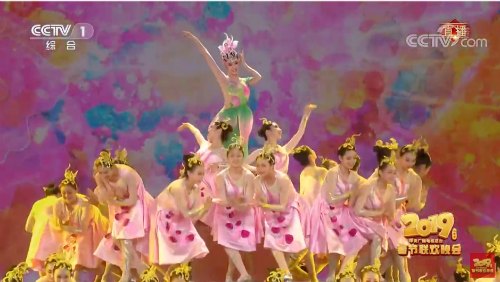
On social media, some netizens think the dance looks like a cake…
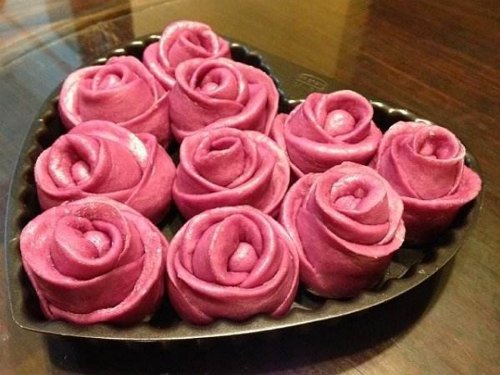
(20:06) Chunwan Social Media Buzz
The ‘Chunwan’, the CCTV New Year’s Gala, is all the talk on Chinese social media.
The hashtag “Chunwan” (春晚) has been dominating top trending lists on Weibo since Saturday, and has been a topic of discussion on Chinese social media for weeks.
“Fake schedules” of the program were leaked, hyped, and recalled. The real program was only shared by various Chinese state media one day before the start of the event, making the hashtag “CCTV Chunwan Programme” (#央视春晚节目单#) one of the biggest trending topics on Weibo right away.
For this year, the hashtags “2019 CCTV Gala” (#2019央视春晚#) and “CCTV Year of the Pig Gala” (#央视猪年春晚#) are particularly used to discuss the variety show on Weibo. Just days ago, the hashtags were already viewed millions of times, going up to 600 million views before the Gala even started.
Many netizens are anticipating to see top Weibo star ‘Angelababy,’ as well as famous actors Ge You and Cai Ming. The members of the super popular pop group TFBoys have also become a topic of discussion.

One noteworthy aspect of tonight’s Gala is its new cooperation with Baidu. Since 2015, one important feature of the CCTV Gala that links it to social media platforms is the exchange of hongbao, red envelopes with money, which is a Chinese New Year’s tradition.
Over the past few years, viewers were able to receive ‘virtual hongbao’ by shaking their smartphones – this has drawn in a lot of young viewers who’d like to get a chance to win some money. This year, instead of cooperating with Tencent’s WeChat or with Alibaba, some RMB 900 million (around $133 million) worth of hongbao is promised to be given to viewers by the Baidu Wallet app during the show. The show will have various moments where this Baidu activity will be promoted.
(20:10) The Presenters introducing themselves..
As you just saw, the presenters briefly already said hello to the audience. We’ll see them throughout the night tonight.
The top five presenters are all familiar faces. In fact, the exact same five hosts also presented the 2018 CCTV Gala. They are Kang Hui (康辉), Zhu Xun (朱迅), Ren Luyu (任鲁豫), Li Sisi (李思思), and Nëghmet Raxman(尼格买提).
The two ladies: Zhu Xun (1973) is a well-known presenter and actress from Suzhou, who is presenting the Gala for the 6th time now. Li Sisi (1986) is a Chinese television host and media personality most known for her role as host of the Gala since 2012.

The three gentlemen: Kang Hui (1972) is a Hebei-born influential CCTV news anchor who has hosted the Gala since 2015. Ren Luyu (1978) is a Chinese television host from Henan, who has also presented the Gala multiple times (2010, 2016, 2018). Nëghmet (1983) is a Chinese television host, born and raised in Ürümqi, Xinjiang, who also is not a newcomer; this will be the fifth year in a row that he hosts the gala.
The presenter who is not here on stage is Zhu Jun (朱军), one of the most well-known CCTV faces. He was involved in a ‘metoo’-like scandal in 2018 when he was accused of sexual harassment by a former intern, something which Zhu has denied. If the case goes to court, might become the first-ever civil sexual-harassment lawsuit in China, Quartz reported in January of this year.
Although probably, it is unsure if Zhu Jun’s absence tonight has to do with this case. Another familiar face, CCTV hostess Dong Qing (董卿), is also not here tonight, although she hosted the CCTV Gala since 2005.
(20:10) DRAGONS!
Ok, so now we’ve really started. Next up is a dragon dance led by male dancer Liu Jia (刘迦). The Nanjing-born dancer is 28 years old and was trained as a dancer in the People’s Liberation Army Art and Drama College.
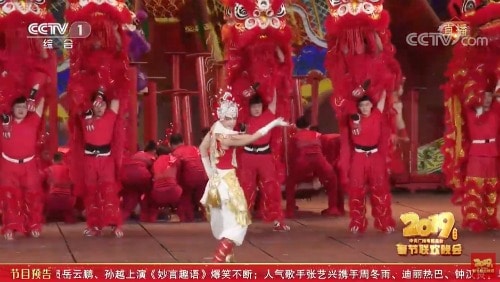
The dragon dance is a form of traditional performance that is particular to the Chinese New Year. The dragon is believed to bring good luck. Did you know that the Beijing Aquarium even holds underwater dragon dances?!
Some netizens think that the strips falling from the air look like “sausages falling from the air.” Oh, the creativity!

(20:15) Tonight’s Venues
Since 2016, the CCTV Gala has adopted a “multi-venue plan,” meaning that apart from the main Beijing CCTV no1 studio there are other ‘subvenues’ from where the show will be broadcasted. In 2018, these were locations in Guizhou, Guangdong, Shandong, and Hainan. The years prior, both in 2016 and 2017, there were also four other locations.
This year, there are three sub-venues: Jinggangshan (Jiangxi), Changchun (Jilin), and Shenzhen (Guangdong). Each venue also has its own hosts, different from the Beijing main studio presenters. Each sub-venue has two hosts, equally divided between male and female presenters.

(Noteworthy: there are two presenters with the name of ‘Yang Fan’: both in Jilin’s Changchun (female), as Shenzhen (male), something which many netizens seem to find quite funny..)
(20:18) Here comes the first crosstalk, but one VIP is missing..
Wonderful words, interesting talk” (妙言趣语 ) is the name of this comical sketch, that features Yue Yunpeng and Sun Yue (岳云鹏、孙越). Xiangsheng (相声), or ‘crosstalk,’ is a dialogue between actors with rich puns and word jokes, that usually sees two actors with one playing the “joker” and the other playing the “teaser. ”
Together with well-known Beijing-born comedian Sun Yue (1979), we see Chinese actor Yue Yunpeng (1985), who is particularly known for his xiangsheng performances.
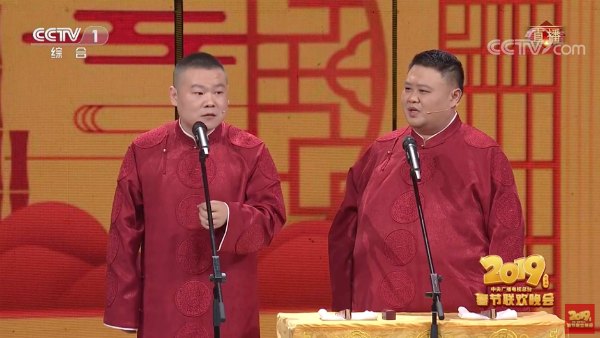
One of the topics that people on social media are discussing is the absence of Feng Gong. Feng Gong (冯巩) is one of China’s most renowned xiangsheng performers. He is best known for his performances in this CCTV New Year’s Gala and has made more appearances on the show than any other major performer. “But where is Feng Gong tonight?” is the question many netizens were asking on Sunday: “This is the first time in 32 years he’s not there, what happened?”
Today, the topic received even more attention, with the hashtag “Feng Gong Not Appearing the Chunwan” (#冯巩无缘央视春晚#) ending up in the top trending lists with 160 million views on Weibo.
Earlier today, Chinese state media reported that Feng Gong was supposed to perform with a traditional ‘xiangsheng’ act that continued last year’s theme, titled ‘I love memorizing verses 2’ (我爱记诗词2), but that it did not pass the final screening of the show because it allegedly was “not funny enough” (“笑果不足”).
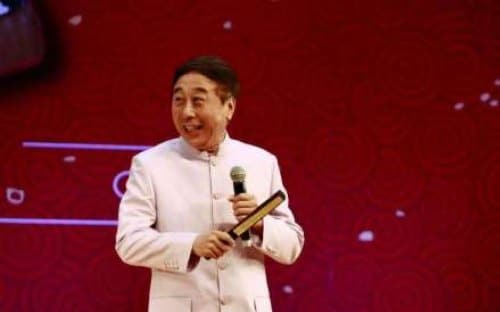
On Weibo, many netizens are disgruntled with the decision, writing: “Honestly, I didn’t think he was that funny last year, but I still want to see him – it’s not about being funny, Feng Gong means more to me than that.” Others are wishing him a happy Chinese New Year, saying: “At least he’ll be able to celebrate it at home with his family tonight.”
As for this act, some people online are joking about it, saying that left is how you look before the Chinese New Year, and right is how you look after (stuffing your face with dumplings..)
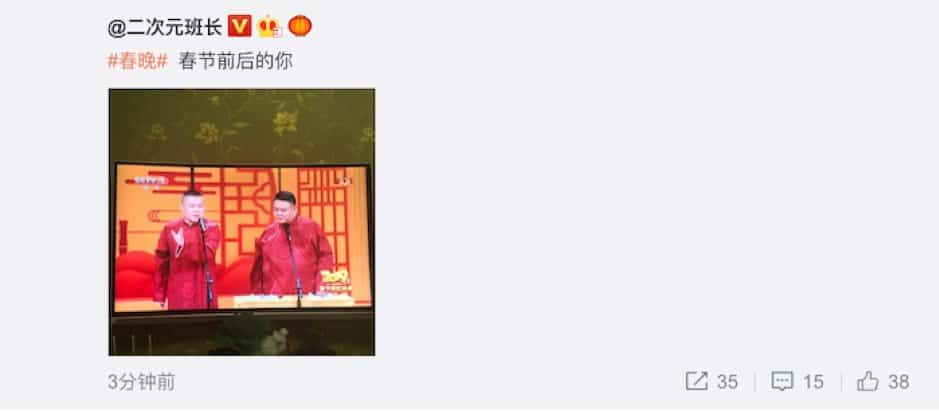
(20:26) “The single dog” and the lipstick
As first jokes on the Gala are going viral, some people think five presenters might not be the right number. Kang Hui here seems to be the “single dog caught between two couples” – something that many people experience during Chinese New Year.
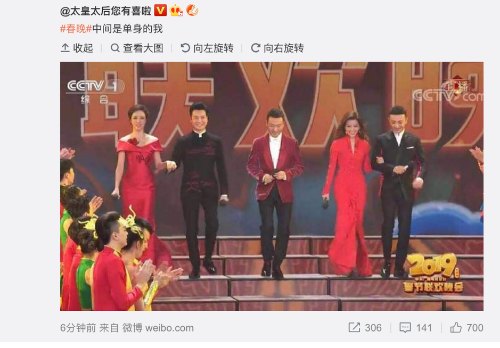
Meanwhile, other viewers are more occupied with the color of the lipstick worn by the presenters. They’ve already been identified as Yves Saint Laurent and Armani brand lipstick colors, 405 and cpb311 respectively.

(20:36) “China’s Happy Event”
This performance, titled “China’s Happy Event” (中国喜事), was joined by Chinese singer Zhang Yixing (张艺兴), popular actress Zhou Dongyu (周冬雨), Hong Kong actor Wallace Chung, Dilraba Dilmurat (迪丽热巴), and Phoenix Legend (凤凰传奇), a Chinese popular music duo consisting of female vocalist Yangwei Linghua and male rapper Zeng Yi. The duo was also part of the CCTV Gala in 2016 and in 2018.

Chinese singer Lay Zhang aka Zhang Yixing (张艺兴) debuted as a member of the South Korean-Chinese boy group Exo and he is quite popular on Weibo.
Is it the sound here, or did that sound very strange? The colors were very very bright though..
(20:38) “Youth Jumps Up”
This is one of the acts that was quite talked about before tonight. It features Chinese actor and singer Li Yifeng, together with the popular actor Zhu Yilong.
It was rumored before that the retired professional basketball player Yao Ming would also be a part of this act. (2.29 m (7 ft 6 in) tall). Don’t see him yet.
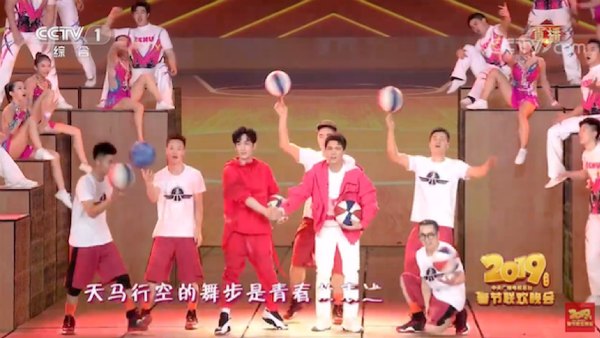
It is quite obvious that this act is lip-synced, something that is discussed annually. It is often claimed that as long as it’s the singer’s own voices that are used to lip-sync to, it is allegedly “justified.” Because the show is live and so big, singing “live” might be too much of a risk, as some performances in the past have shown. Lip-syncing, however, is also not without dangers, as some singers can really be quite off.
Various fan clubs of these artists don’t care about lip-syncing, though. Screenshots of fans going ab-so-lu-tely crazy over this performance are making their rounds on Wechat.
(20:48) “Platform”
First skit of the night!
These sketches are called ‘xiǎopǐn’小品 in Mandarin, which basically is a Chinese comedic performance in the form of a short skit between two or more performers. It is similar to xiangsheng or crosstalk. Both are often performed together in Lunar New Year galas. The main difference between the two forms is that xiaopin often involves the use of stage props and physical actions of the actors, similar to western comedic skits, while xiangsheng is closer to stand up comedy, relying primarily on speech and word jokes.
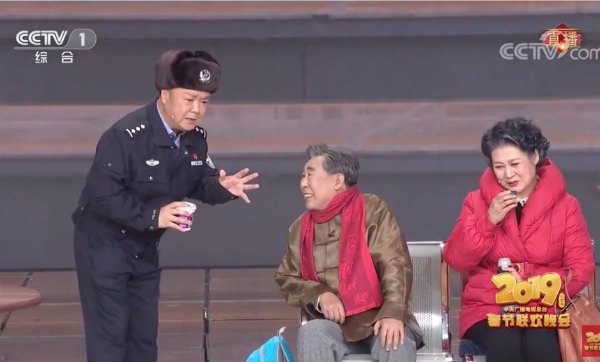
This sketch is titled “platform” and is performed by various well-known actors, who are all playing people waiting for their train. An elder couple where the man has called the wife “honey” for a long time (before he actually forgot her name), and then there’s a young man whose wife left on a train with his jacket and mobile phone. He is worried about leaving his wife with his mobile phone since he transferred 10,000 rmb to his parents before Chinese New Year, something she was not supposed to know about. When he manages to get in touch with her via the guard’s phone, it turns out she just transferred 20,000 rmb to both parents. Meanwhile, another couple is fighting about whose home to visit for the Spring Festival. This sketch clearly touches upon the issue of love issues among various generations. Of course, it all ends with a happy ending, where all couples find a solution for their problems they’re all happy with.
A special role in this sketch is the train that comes. It is the “Revival” (Fuxing) train, which first started running in 2017 and was further developed in 2018. The train is promoted for being “made in China.”
(21:04) Home, home, home, from Hong Kong to Taiwan and beyond
This year is clearly about “home,” “going home,” as stressed by the presenters. This song is titled “Mum, I’m home.” There’s a political message in the selection of singers. This song is sung by Taiwanese singer Terry Lin, the Hong Kong singer Joey Yung, and the overseas Chinese singers Sha Baoliang and Han Zi.

(21:08) Moving over to Jiangxi province
We’re in Jinggangsheng (井冈山) now, the first sub venue of the night, which is also known as the “cradle of the communist revolution” or the “holy land of China’s revolution” in the southeastern province of Jiangxi.
Two songs are performed here, along with a recital. One of the stars here is Chinese actress and singer Liu Tao, who is from Jiangxi herself. She sings together with actor Huang Xiaoming.
Jike Junyi (吉克隽逸) sings the other song. She won third place in the first season of the reality talent show The Voice of China in 2014, which is when she became instantly famous.

(21:13) Peking Opera
Time for some Traditional Opera by Yan Wei, Yuan Huiqin, and others, who perform “Beautiful Pear Garden” (锦绣梨园). This is the 9th act of tonight, of some 35+ acts in total. This is the only opera act, as far as I now know.

The Peking Opera actress Yuan Huiqin, whom we see here, previously expressed her love for Peking Opera in an interview with The Telegraph, saying: “Love and hatred, vulnerability and fearlessness, life and death: Peking Opera can communicate raw emotions with sophisticated body language that no words can match.”
Some people joking with this scene: “Don’t stand in front of people when they’re trying to make a selfie.”
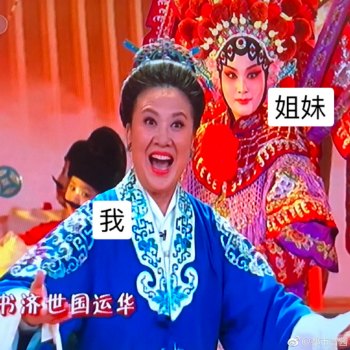
(21:17) Meanwhile, in the audience..
A guy spotted in the audience with his phone is generating some jokes on Weibo. “This is me [on my phone],” some say, while the rest of the audience is “my family.”

(21:23) “Year of the Pig”
We’ll update you soon with the sketch that’s currently airing, but didn’t want you to miss out on this image that’s going around social media currently. It’s the year of the Pig, it’s the year of Peppa, but for many people, Spring Festival is all about the food. This image shows all the different dishes you can make with pork…
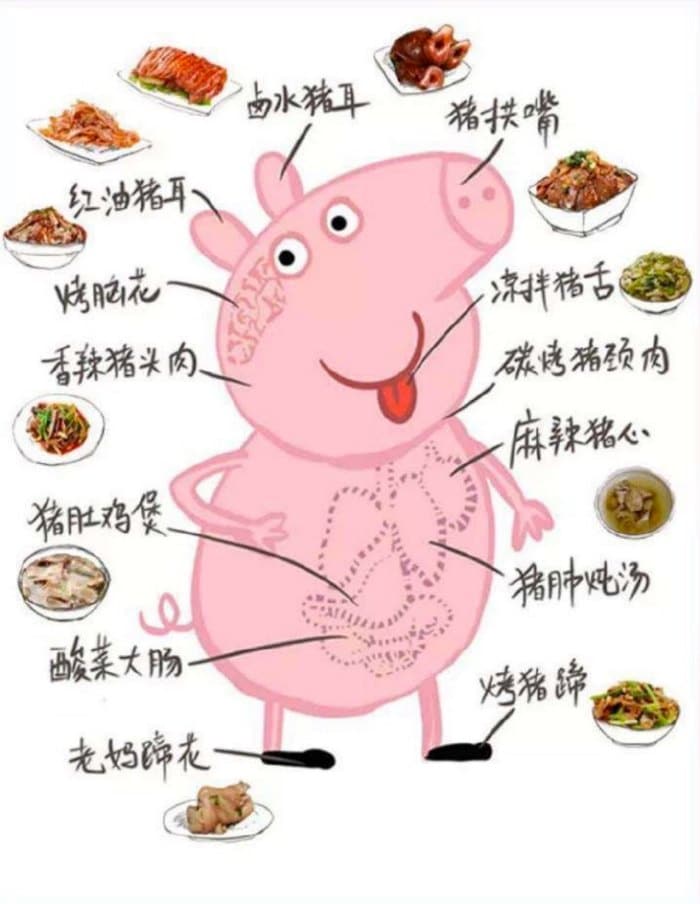
(21:26) The CCTV Gala Theme
Every year, the CCTV Gala is themed around a certain topic. This topic, obviously, is in accordance with the official state ideology and is quite telling on what specific aspects the Party would like to propagate for the upcoming year.
As said earlier in this liveblog; although the CCTV Gala is also a commercial event (the station is state-owned but also profit-seeking in a highly competitive media environment), it is also still highly political, and carries official propaganda along with consolidating political centralism.
The central theme of 2018, for example, was “Chinese values, Chinese power.” Other previous themes are “National Unity” or “Chinese Dream.”
This year, the Gala is themed around the idea of “New China.” The full theme, as described by CCTV, is: “Advancing the New Era, Celebrating a Happy Year” (奋进新时代、欢度幸福年).
The past two years, the Gala has been directed by Yang Dongsheng. This year, Liu Zhen (刘真), Deputy Director of CCTV arts channel, is in charge of the program. He is known for previously directing the 2009 anniversary night of the Great Sichuan earthquake.
(21:31) Office Time
This office skit is performed by Chinese actresses Yan Ni and Ya Hailong, together with actor Zhou Yiwei.
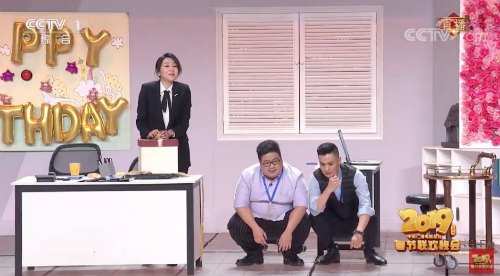
The skit evolves around a rehearsed marriage proposal going wrong, with one worker accidentally proposing to the company director. The boss walked in when they were practicing, and misunderstood the gifts and cakes they prepared, thinking they were for her instead. Later on in the act, the secret is revealed, but the boss responds surprisingly ok when the office worker revealed he was always working overtime, having no time for these personal matters. Work pressure is a recurring theme on social media too, a theme incorporated in this sketch.
(21:42) Dance/song “The Distance of Time” (with flying drones)
Two ‘kings’ of Mandopop, Sun Nan and Zhang Jie (also known as Jason Zhang) perform on stage here.
Sun Nan has performed at the CCTV Gala several times before. His 2016 performance with 540 robots, all dancing simultaneously, was quite spectacular.

They are accompanied by the Zhongnan Minzu University Music Dance Troupe, and you can see drones flying all around them.
(21:46) “The Spirit of Shaolin”
The first martial arts performance of the night, really quite spectacular, performed by members of the Shaolin Tagou Martial Arts School from Henan.
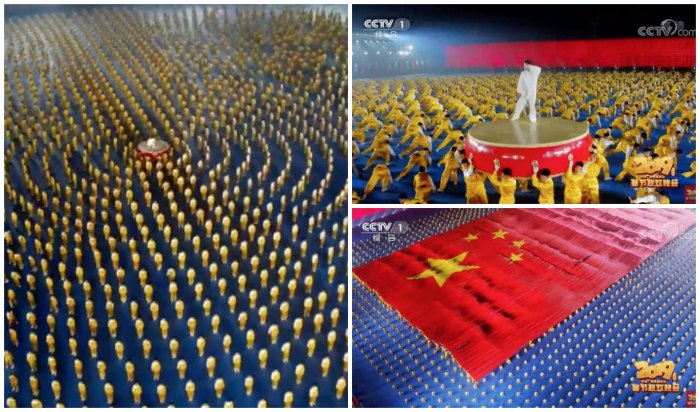
This is also the first big Chinese flag we spotted tonight, and it’s HUGE!!!
(21:54) “‘Son’ is here” sketch with Cai Ming
The third sketch of the night features an all-star cast with actors Ge You, Cai Ming, and Pan Changjiang.
Cai Ming (1961) is known for performing sketch comedy in CCTV New Year’s Gala since 1991. She is known for her sharp language. Cai is quite active on Weibo. Earlier this week, she posted a ‘selfie’ of her and Dilraba Dilmurat, the singer of Uyghur heritage who appeared in the show earlier tonight.

Pan Changjiang (潘长江, 1957) is a famous skit actor who has regularly appeared in the Gala since his younger years. His colleague Ge You (also 1957) is one of the most recognizable acting personalities in China. He plays a man who is selling “health products,” conning older people out of their money.
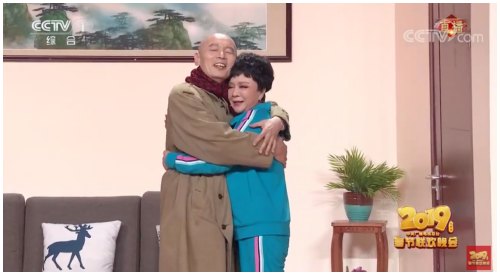
(22:04) “Me Watching the Gala vs Me Watching Weibo”
This post is making its rounds on Weibo now, saying “Me watching the CCTV Gala versus me watching Weibo.”

It really seems that the Gala has turned into a social media craze, where people are more interested in the jokes going around Wechat and Weibo than the actual event itself. This also means that the Gala is becoming more popular among young people, who are creating their own traditions from the classic ‘Spring Festival ritual’ of gathering around the TV with the family to watch the Gala together.
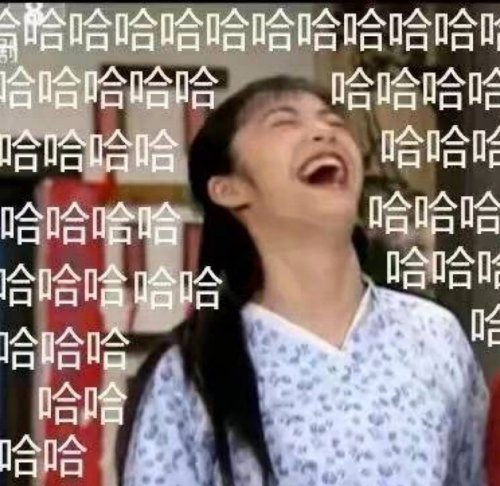
(22:07) About that Shaolin Act…
It was the most spectacular act of the night thus far. But were those real people or were they Minions? This is the joke that’s going viral now.
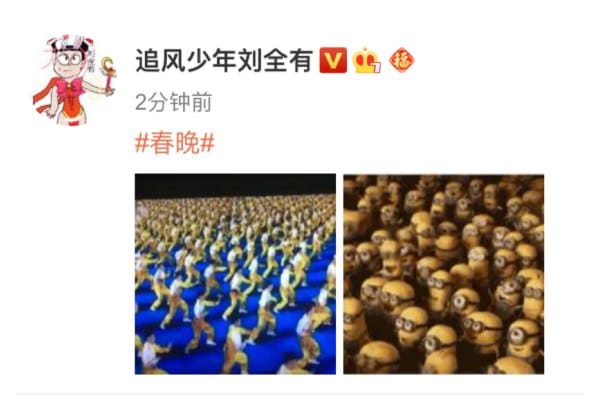
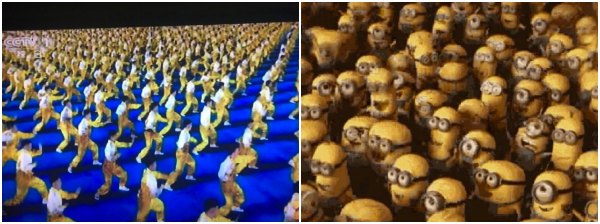
(22:09) TFBoys here!
This is one of the most anticipated acts of the night, since it is performed by members of the hugely popular TFBOYS. This act is titled “We’re All Pursuing Dreams” (我们都是追梦人), and is likely hinting at the “Chinese Dream.”
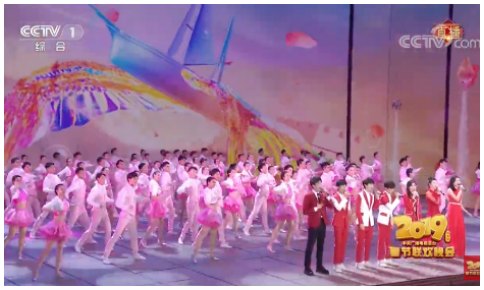
This is the fourth time that members of TFBoys are making their appearance at the show since their first performance at the 2016 CCTV Gala.
(22:13) A bit of magic
Taiwanese magician Lu ‘Louis’ Liu (刘谦, 1976) is at the center of this magic act. He is known as the only Taiwanese magician to perform in Hollywood’s ‘Magic Castle,’ and is commonly referred to as ‘Taiwan’s most renowned magician.’ He previously performed at the CCTV Gala in 2009.
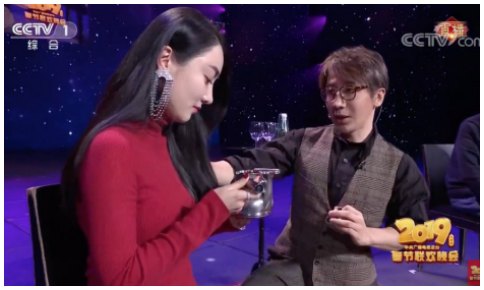
(22:25) “Seizing a seat”
This sketch is called “Seizing a seat,” and I’d actually expected it to be hinting at two separate incidents on Chinese high-speed trains in 2018 that became huge trending topics. In late August of 2018, one rude man from Shandong who refused to give up the seat he took from another passenger became known as the “High-Speed Train Tyrant” (高铁霸座男 gāotiě bà zuò nán) on Chinese social media. Later, a woman from Hunan was dubbed ‘High-Speed Train Tyrant Woman’ (高铁霸座女 gāotiě bà zuò nǚ”) by Weibo netizens, when a video of her bizarre behavior also became trending; she had taken a seat assigned to another passenger while riding the train from Yongzhou to Shenzhen and refused to give it up.
But this particular sketch now seems to be focused on “seizing a seat” in a classroom instead, with parents during a parent’s meeting fighting over who gets the best seat at the school. The story focuses on parents who are not involved in their kid’s education, leaving the responsibility to the school, with the moral behind the story allegedly being that parents should be more involved in their child’s education.
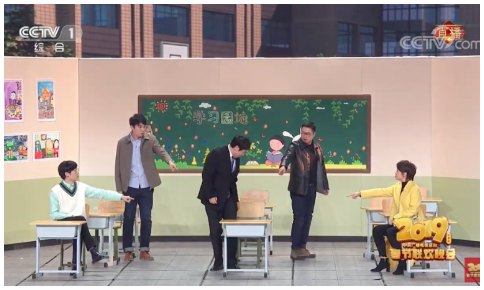
“This is my life,” some online commenters are saying, posting the meme below (the speed in which Gala-related memes are spreading on Weibo and Wechat is incredible!).
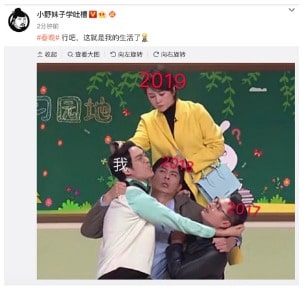
(22:35) The sellers who are making money through the Gala
Throughout the Gala, there are smart people who are tracing down the clothes and shoes worn by the performers, which are also for sale.
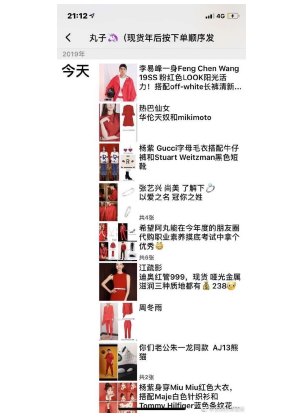
(22:41) All over the place!
After a brief public announcement, we’re now watching the dance “Looking for Friends.” This dance is performed by the ‘Air Force Blue Sky’ children’s dance troupe (空军蓝天幼儿艺术团) and it is all over the place!
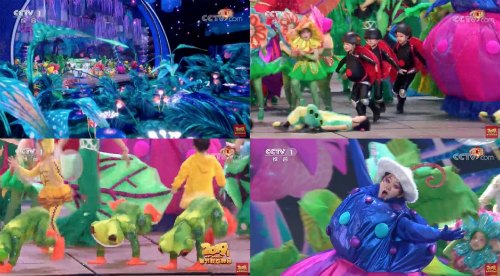
(22:43) Sleepless night
The song “No Sleep Tonight” (费玉清) is brought by Fei Yu-ching. This Taiwanese singer recently became a topic on Chinese social media with a video featuring his cool dance moves during his younger years. After 46 years in showbiz, his Farewell Tour is taking place this year.
He is joined on stage by Kelly Chen, a Hong Kong Cantopop singer and actress. She is also known as the “diva of Asia.”

Some good Monday vibes: Taiwanese singer Fei Yuching in his younger years with some oldskool moves. Really loving this! After 46 years in showbiz, his Farewell Tour is taking place this year #费玉清 pic.twitter.com/aWW0TPazDd
— Manya Koetse (@manyapan) 28 januari 2019
(22:46) The Baidu sponsor
Now it is time for the aforementioned Baidu activity. At this year’s event, China’s search giant Baidu, has the exclusive right to interact with the huge audience of the CCTV Gala via red packets interactive activity. The audience can get red packets through shaking, searching and watching video clips on Baidu app.
(22:49) Xiaopin “Show you the drill”
On stage, we see the award-winning (stage) actor Lin Yongjian, together with Sun Tao and Ju Hao, a well-known comedian.

Usually, the sketches performed during the Gala can be quite controversial. Sometimes for the way they depict women, last year specifically for the Africa blackface skit. It seems that this year, the sketches are quite safe and aren’t triggering any controversy, yet. But the night is still young!
(22:57) Air Jordan Craze
Many of the clothes and shoes and other items featured in today’s Gala are becoming hot selling items. Right now, people are going crazy over the Air Jordans that were worn in one of the acts earlier tonight.



(23:04) Moving over to Changchun
Moving over to the second sub-venue of the night now, where we see Aska Yang (Yang Zongwei) singing on stage. Aska Yang had his debut in Taiwan as a contestant on season one of Taiwanese TV singing contest One Million Star.
He is joined by Angela Yeung Wing, better known by her stage name Angelababy, a Chinese model, actress, and singer based in Hong Kong, who is one of the Weibo stars with the most followers.
The second Changchun act is performed by Chinese actors Liu Ye and ‘Johnny Bai.’
Fireworks! Drones! And one of the cars turning into a ‘Transformer’! So far, the sub-venues offer some of the most spectacular performances of the night.
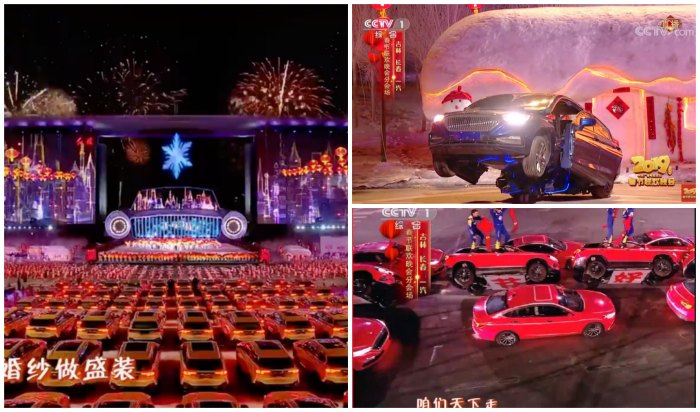
The focus on cars here relates to Changchun as one of China’s ‘car cities’ as it is home to the brand that produced the first national auto brand (长春一汽), last year was the 65th anniversary of the factory’s founding.
(23:09) National Ballet of China
This is yet another dance, there are supposed to be four big dancing acts tonight. The dance is titled the “Dunhuang Flying Asparas” (敦煌飞天), and is performed by the National Ballet of China, also known as the Central Ballet Troupe, which employs over 70 dancers.

(23:13) The Legends are Here! “My Motherland and I”
This song, titled “My Motherland And I” (我和我的祖国), is one of the acts that has received quite some attention in Chinese media prior to the Gala because of the very special reunion between some of China’s older legendary musical artists.
This special reunion also shows that this year, the Gala wants to pay extra attention to China’s elderly, something that contrasts with last year’s Gala, that was very much focused on young people and new talent.
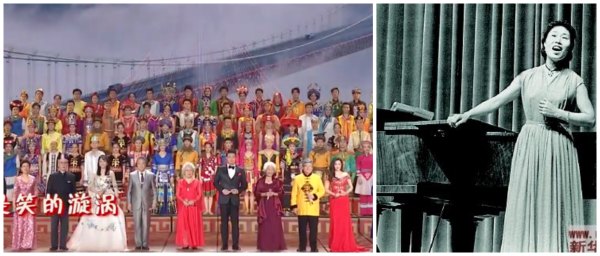
One of the performers here on stage is Guo Shuzhen, who is 92 years old and is a famous “legend” within China’s music education.
All artists here are very famous ‘legends’; Li Guangxi (1929), Hu Songhua (1931), Liu Bingyi (1935), Yu Shuzhen (1936), De Dema (1947).
Also on stage is Yang Hongji (杨洪基, 1941), a Chinese national-level actor and one of China’s most outstanding baritones.
And there’s Guan Mucun (关牧村,1953), a female Chinese mezzo-soprano singer from Henan province who is known for developing her own musical style by blending Western and traditional Chinese melodies.
They all perform together with Chinese artists of the younger generations.
(23:25) Xiaopin “Don’t Know Whether to Laugh or Cry”
Chinese xiangsheng performer, actress and comedian Jia Ling (1982) stars in this comical skit together with Zhang Xiaofei and Xu Juncong.
The story features a young man who ordered a cleaning lady to clean his apartment, but the woman (in red) has an injured shoulder so she can’t really do it. She ordered another service to do the cleaning for her (in yellow) instead. That young woman then thinks the lady in red is actually the wife in the house who refuses to clean the house – all the confusion between the people is creating a chaotic and comical situation.
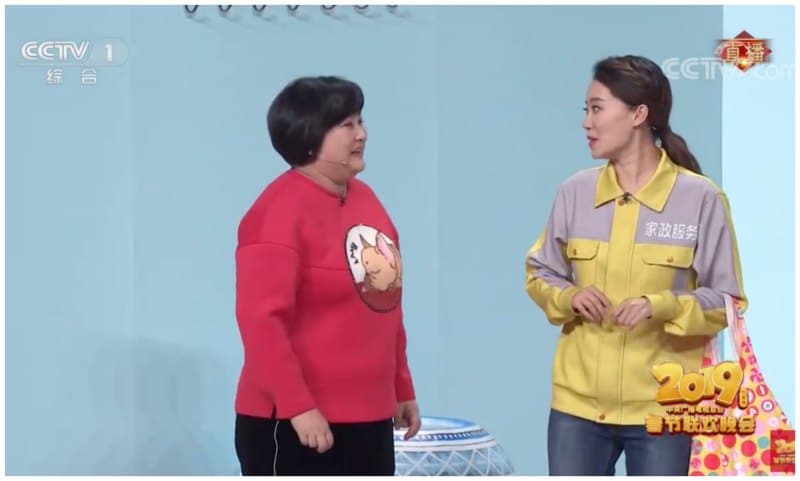
(23:39) Here comes Jackie Chan!
Jackie Chan (成龙) has become an annually returning performer at the CCTV Gala. Although his performances are always much-anticipated, they’ve also been pretty cringe-worthy. In 2017, the song performed by Jackie that was simply titled “Nation” was met with criticism for being overly political. Last year, the Hong Kong martial artist sung a song that was called “China.”
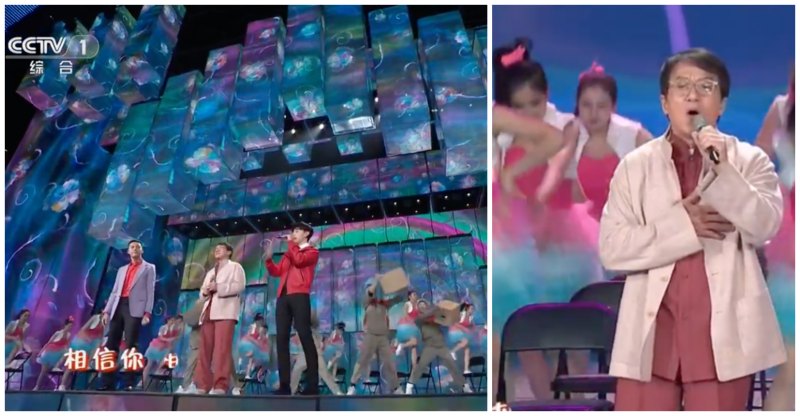
This year, the title of the song is a bit deeper than in previous years: it is titled ‘My Struggle, My Happiness’ (我奋斗我幸福), and is sung together with Hong Kong singer and actor William Chan and with Deng Lun.
Deng Lun (邓伦) (1992) is a Chinese actor who gained widespread popularity with the family drama “Because of You”, an adaptation from the 2014 Korean drama “Jang Bo-ri is Here.”
Also on stage are performers from Bapaweilai, a children’s art education group based in Hong Kong.
(23:44) Meanwhile backstage…
While “Together towards Happy China” is being performed on stage by Zhang Ye and Lu Jihong, famous Chinese actor Ge You is all the talk on Weibo for a photo that has popped up of him backstage, showing the actor tired on the couch.
A famous meme in China also shows the actor in a similar position.
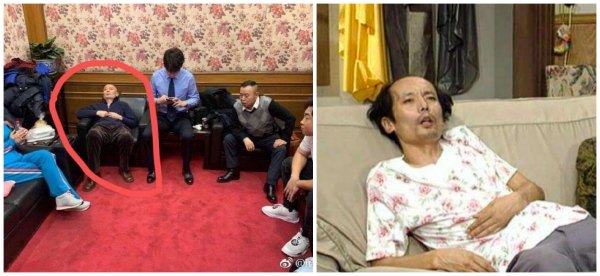
(23:45) “Hero Flight Sichuan Flight 3U8633”
As every year, this is the part of the show where some ‘exemplary persons’ get honored for their accomplishments. Noteworthy is that the crew of Sichuan Airlines is honored tonight.
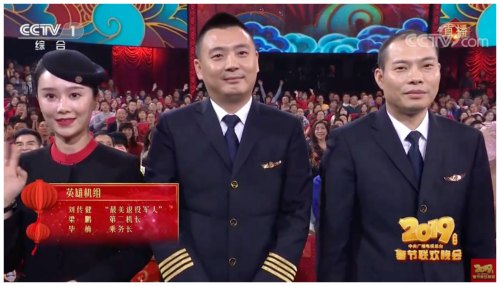
In May of 2018, pilot Liu Chuanjian on Sichuan Airlines 3U8633 made an emergency landing in southwest China after a broken cockpit window sucked his co-pilot halfway out of the aircraft. He braved the intense cold and blasting wind to land the plane in about 20 minutes, and in doing so, rescuing all 128 people aboard the Airbus A319.
(23:48) “Thumbs up for the New Era”
This song really resonates with the Gala’s “New China” theme. The singer is Wulan Tuya (乌兰图雅), who is also known as the “Flower of Mongolia.” She was born and raised in Inner Mongolia, and now combines elements of Mongolian traditional music with electronic beats in her music.
This is one of the spectacular performances of the night, that is joined by a number of artists who were selected through a special CCTV Gala contest.

The other performers come from various performance groups from Beijing, Shandong. Harbin, Sichuan, etc.
(23:50) Last sub-venue of the night: Shenzhen
The last sub-venue of the night is Shenzhen, which is often also called China’s “Silicon Valley” or the “tech capital of China.” This venue features two different acts, both songs, titled “Let youth Be Free” and “Friends.”
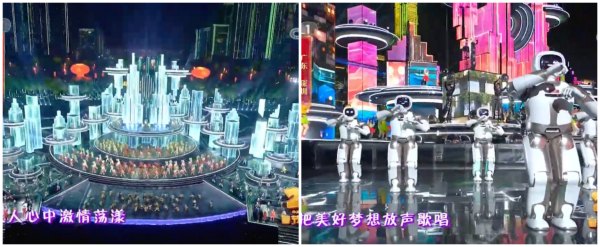
(23:58) Some old-school propaganda
“Together With my Homeland,” sung by Lei Jia and Han Lei, is the last song before the 0.00 countdown moment.
Lei Jia is a Chinese folk soprano and ‘national class one performer.’ Han Lei is a singer-songwriter of Mongol descent who is also known as Senbor. He rose to prominence in 1997 on the CCTV New Year’s Gala. The screen behind the artists shows some old-school flag raising and China’s urban skylines.

(0:00) Time for the Countdown!!!

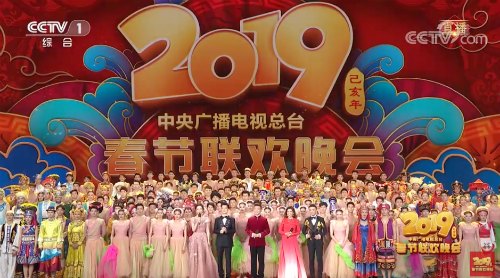
(0:05) Building Together on the Chinese Dream
Fireworks everywhere, firecrackers everywhere. Time to sing about building on the Chinese Dream together, a theme that has been consistently featured in the Gala over the past years. Singers: Cao Fujia, Xian Zi, A Yunga, Ju Laiti, and ‘Xingguang Dadao’ talent show winner Ang Sa.


(0:14) Acrobatics
We’re reaching the final acts of the night. This performance shows acrobatics by various renowned acrobatic groups from Henan, Guangxi, Dalian, and other places.

Thus far noticeable tonight: the skits have been very ‘safe’ and there has been no *excessive* display of straightforward political (Party) themes compared to other shows in earlier years; the images of Mao, Deng, Xi, and others that would usually make their way into the show have not been there (or I haven’t noticed them). Although there’s usually a very clear focus on unity in bringing together various ethnic groups, that has not popped up in this show as much as it has in the past. Instead, there has been more focus on ‘old’ and ‘young’ uniting, with “China’s New Era” being the clear theme of the night.
The acrobatic performance is followed by a special segment that shows water ballet. The act is titled “Burst into Bloom” (绽放).
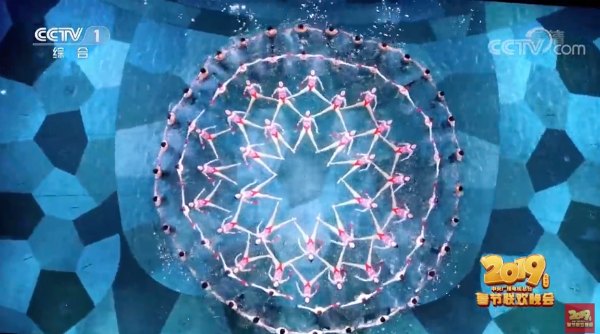
(0:19) “Love Substitute Driver”
‘Daijia’ is a service that is provided by various companies in China, where one can hire a substitute driver to drive them home in their own vehicles. This is what this last skit of the night focuses on.
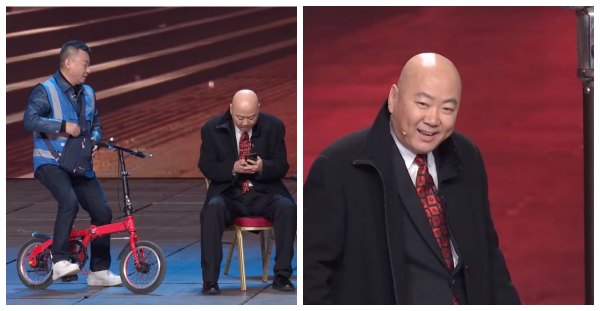
The service is encouraged because it decreases the risk of people drunk driving. The driver will usually arrive by bike, then drives the person home in their own car, with the bike in the back, and then cycles on to the next customer from there -quite convenient and safe (for the people who’ve been drinking and can no longer drive)!
In this sketch, with Guo Donglin and Shao Fenghe, the drunk man actually has no money and just called the driver because he is lonely, lovesick, and needs some companionship. The moral of the story? No matter how low you are, you can always get back up.
(0:38) “Outstanding Beauty”
After the song “The Brightest Star in the Sky,” we’ve now arrived at the final of the night, featuring the dance performance “Outstanding Beauty” with lead dancers Li Yanran, Wang Jiaxin, and Hu Tulan.

A noteworthy moment before this segment is that the presenters of the night asked the viewers when they’d get married and have a (second) baby…(啥时候结婚啊?啥时候要二胎啊). Perhaps it’s mocking the pressure many young people at home are facing.

Unforgettable Night!
The last song of this night is “Unforgettable Night” (难忘今宵). It is sung by the 74-year-old singer and dancer Li Guyi (李谷一), who became famous with the song ‘Homeland Love’ (乡恋) around the time of China’s Reform and Opening Up – the singer and her songs are nostalgic for many viewers.
Li Guyi also appeared at the very first version of the Gala in 1983, and became the singer that sang the most at the event.

Li Guyi sings the same song every year at the end of this show. The last song ends with all performers of the Beijing venue on stage. The song repeats the phrases 共祝愿 祖国好: let’s all wish together that the country will be good, that is will last long and be prosperous. The hosts wish everyone a happy new year. It’s a wrap!
Thank you all for watching the CCTV Gala with us and happy new year to you.
– By Manya Koetse & Miranda Barnes
References
Gao, Yuan. 2012. “Constructing National Idenitiy through Media Ritual: A Case Study of the CCTv spring Festival Gala.” Master’s Thesis, Media and Communication Studies, Uppsala University.
Jing, Meng. 2019. “Baidu seeks to play catch up in mobile app race with bet on world’s most-watched TV show.” South China Morning Post, 18 January https://www.scmp.com/tech/big-tech/article/2182616/baidu-seeks-play-catch-mobile-app-race-bet-worlds-most-watched-tv-show [2.2.19].
Scocca, Tom. 2011. Beijing Welcomes You: Unveiling the Capital City of the Future. New York: Riverhead Books.
Wang Ge. 2015. “Popular Spring Festival Gala language: Sociocultural Observations.” In Linda Tsung and Wei Wang, Contemporary Chinese Discourse and Social Practice in China, 185-200. Amsterdam/Philadelpia: John Benjamins Publishing Company.
If you enjoy What’s on Weibo and support the way we report the latest trends in China, we would appreciate your donation. It does not need to be much; we can use every penny to help pay for the upkeep, maintenance, and betterment of this site. See this page for more information.
Spotted a mistake or want to add something? Please let us know through email.
©2019 Whatsonweibo. All rights reserved. Do not reproduce our content without permission – you can contact us at info@whatsonweibo.com
Subscribe

Hu Xijin’s Comeback to Weibo

Weibo Watch: “Comrade Trump Returns to the Palace”

The Price of Writing Smut: Inside China’s Crackdown on Erotic Fiction

Controversial Wanghong Livestreamers Are Becoming a Weibo Staple in China

The Viral Bao’an: How a Xiaoxitian Security Guard Became Famous Over a Pay Raise

“Land Rover Woman” Sparks Outrage: Qingdao Road Rage Incident Goes Viral in China

China at Paris 2024 Olympics Trend File: Medals and Moments on Chinese Social Media

Weibo Watch: The Land Rover Woman Controversy Explained

Stolen Bodies, Censored Headlines: Shanxi Aorui’s Human Bone Scandal

Fired After Pregnancy Announcement: Court Case Involving Pregnant Employee Sparks Online Debate

Team China’s 10 Most Meme-Worthy Moments at the 2024 Paris Olympics

Weibo Watch: Going the Wrong Way

Weibo Watch: Shaping Olympic Narratives

“No Kimonos Allowed” – Ongoing Debate on Japanese Attire in China

The Rising Influence of Fandom Culture in Chinese Table Tennis
Get in touch
Would you like to become a contributor, or do you have any tips or suggestions? Get in touch here!
Popular Reads
-

 China Insight6 months ago
China Insight6 months agoThe Tragic Story of “Fat Cat”: How a Chinese Gamer’s Suicide Went Viral
-

 China Music7 months ago
China Music7 months agoThe Chinese Viral TikTok Song Explained (No, It’s Not About Samsung)
-

 China Insight8 months ago
China Insight8 months agoThe ‘Two Sessions’ Suggestions: Six Proposals Raising Online Discussions
-

 China Insight12 months ago
China Insight12 months agoThe Story of Li Jun & Liang Liang: How the Challenges of an Ordinary Chinese Couple Captivated China’s Internet

